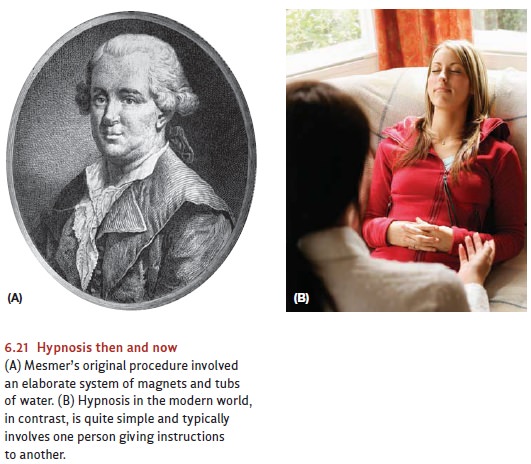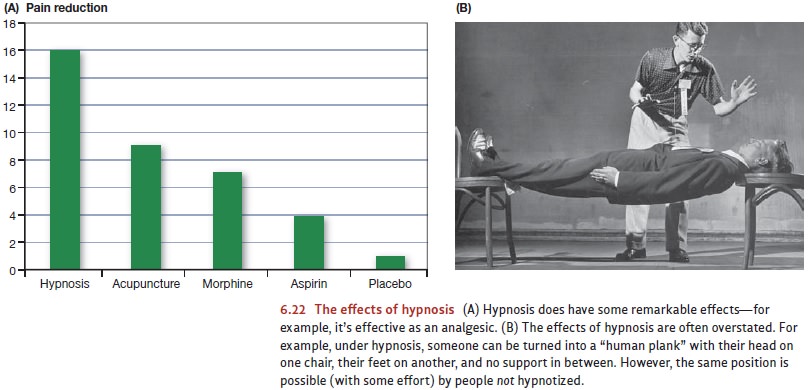Chapter: Psychology: Consciousness
Consciousness: Hypnosis
Hypnosis
Everyone has experienced the
altered consciousness associated with sleep. A different form of altered
consciousness is less common, but still deeply interesting. This is the altered
state that a person reaches when hypnotized. Many myths are associated with
hypnosis—including what it is and what it can accomplish. At its essence,
though, hypnosis is a highly relaxed
state in which the participant is extremely suggestible, andthe result is that
he’s likely to feel that his actions and thoughts are happening to him rather
than being produced by him voluntarily. But what’s the exact nature of this state?
WHAT CAN HYPNOSIS ACHIEVE ?
When German physician Franz
Mesmer (1734–1815; Figure 6.21A) first demonstrated his early version of
hypnotism, his technique relied on magnets and tanks of water. Mesmer moved
around his hypnotic subjects while making complex gestures and passing his

hands over their bodies. Most of
these details, however, were just theatrics; modern hyp-nosis procedures are
more straightforward (Figure 6.21B). The person being hypnotized sits quietly
and focuses on some target—a particular sound, or a particular object that is
in view. The hypnotist speaks to the person quietly and monotonously,
encouraging her to relax. The hypnotist also offers various suggestions about
what will happen—including many things that are just inevitable as the person
relaxes: “Your eyelids are drooping downward,” or “Your limbs are getting
heavy.” Gradually, the hypnotist leads the person into a state of deep
relaxation and extreme suggestibility.
Extraordinary claims are
sometimes made about what people can do while in a hypnotized state, but we
need to examine these claims with care. It’s true, for example, that people can
be led to perform unusual and even bizarre actions; but in many cases, these
actions are not the result of the hypnotic state at all. For example, people
under hypnosis can be shown fluid and told that it’s a powerful acid; they’ll
then comply with the cruel instruction to fling the “acid” into another
person’s face. Often, this demonstration is accompanied by the statement that
no sane person would perform this act without hypnosis; so, apparently, we’re
to believe hypnosis can overcome someone’s inhibitions and lead them into
otherwise unspeakable behavior. It turns out, though, that this argument is
mistaken: Exactly the same behavior can be produced by simply asking people to pretend to be hypnotized and to act the
way they think a hypnotized person would (Orne & Evans, 1965). Clearly,
therefore, the hypnosis itself is playing little direct role in producing this
behavior.
We’ll also discuss some of
hypnosis’s alleged effects on memory. For example, in a procedure called hypnotic age regression, the hypnotized
person is instructed that he has returned to an earlier age—and so is now three
years old, for example, or even younger. The hypnotized person will behave
appropriately, talking in a child’s voice and doing childish things. Even so,
the person has not in any real sense “returned” to an earlier age. Instead,
he’s simply acting like an adult believes a child should. We can obtain similar
performances simply by asking people who aren’t hypnotized to simulate a
child’s behavior. In addition, it turns out that adults have a number of
mistaken beliefs about how children behave; under hypnosis, the age-regressed
person acts in a fashion consistent with the (incorrect) adult notions and thus
not like a real child (Silverman & Retzlaff, 1986).
Likewise, many people believe
that hypnosis is a powerful way to retrieve lost memories— for example, they
think that under hypnosis, a witness to an auto collision can recall precise
details of where people were standing at the accident scene, what the cars’
license plate num-bers were, and more—almost as though hypnosis provided a
“rewind” button that allows the person to relive the event and note the details
they had neglected in the original episode. None of this is real, however.
There’s no reason to believe that hypnosis improves memory. Instead, hypnosis
may actually undermine memory—making the person more confident in their
recollection, whether the recollection is correct or not; and making them
markedly more susceptible to leading questions or suggestions that the
hypnotist might offer (e.g., Sheehan, Green, & Truesdale, 1992). This is why
most American, Canadian, and British jurisdictions forbid courtroom testimony
that has been “enhanced” through hypnosis.
At the same time, hypnosis does
have some real and striking effects. For example, people under hypnosis can be
given various instructions for how they should behave after the hypnosis is
done, and in many cases these posthypnotic
instructions are effective. These instructions can, for example, help
people to relax or to eat less (but despite the hype, similar posthypnotic
instructions do little to help people give up cigarettes or other drugs; Nash,
2001). Likewise, a hypnotist can produce posthypnotic
amnesia simply by instructing the hypnotized individual to forget certain
events that happened while the person was in the hypnotized state (Kirsch,
2001). The memory for these events, however, is still in place, even if the
person can’t retrieve it. We know this because the posthypnotic amnesia can be
“lifted” with a subsequent hypnotic instruction that allows the lost memories
to return.
One of the more dramatic effects
of hypnosis, and a powerful indication that hypno-sis can create a special
state of mind, is the phenomenon of hypnotic
analgesia—pain reduction
produced through hypnotic suggestion (Hilgard & Hilgard, 1975; Patterson
Jensen, 2003; Patterson, 2004).
Using this technique, people have undergone various dental procedures and some
forms of surgery without any anesthetic, and they report little suffering. In
some studies, hypnotized people seem to suffer less than people given various
other pain treatments, including acupuncture, aspirin, or even morphine (Stern,
Brown, Ulett, & Sletten, 1977).
It’s important to mention,
though, that not every individual shows the hypnotic analgesia effect, because
some people can’t be hypnotized. In fact, susceptibility to hypnosis varies
broadly. Some people are largely unmoved by a hypnotist’s suggestions, and
other people—“hypnotic virtuosi”—are powerfully influenced. The degree of
susceptibility seems to be linked to how easily the individual can become
absorbed in certain activities, such as watching a movie or playing a video
game—and the people who are more readily “absorbed” are likely to be more
hypnotizable (Barnier & McConkey, 2004; Kirsch & Braffman, 2001;
Tellegen & Atkinson, 1974).
THEORIES O F HYPNOSIS
Does hypnosis truly produce an
altered state of consciousness, so that a hypnotized person is in a
qualitatively different state of mind than someone who’s not hypnotized? More
broadly, what exactly does hypnosis achieve? Some people argue that hypnosis
needs to be understood in relatively mundane social terms—one person (the
hypnotist) simply has an enormous influence on another (the person hypnotized).
Social influences can be incredibly powerful, leading us to perform a range of
actions that we think we would never do. Perhaps hypnosis can be understood in
similar terms—and, if so, then it’s more like our ordinary mode of
consciousness than one might suppose (e.g., Spanos, 1986; Spanos & Coe,
1992).
We’ve already seen some of the
data consistent with this view. For example, hypnotic age regression isn’t a
low-tech time machine; instead, the “regressed” individual is sim-ply playing a
role as well as she can. Likewise, memories called forth under hypnosis are
likely to be constructions—not the result of some highly effective and
specialized

process. Similarly, at least some
of the remarkable feats associated with hypnosis can also be performed without
hypnosis (Figure 6.22), further undermining claims about the special status of
the hypnotic state.
A very different proposal,
however, is that hypnosis involves a special state of dissociation (Hilgard, 1986, 1992), a mental state in which we
shift out of our normal “first-person” per-spective. We might feel like we’re
“outside of ourselves,” watching ourselves from a detached position. We might
also feel like our experiences are happening to someone else and that our
actions are controlled by someone else. Some clinical psychologists suggest
that disso-ciation is a powerful means through which each of us can shield
ourselves from emotion-ally painful experiences. The proposal here, though, is
that similar mechanisms are involved in hypnosis, so that our conscious control
of our thoughts, and our sense of immediate experience, are somehow set aside
for as long as the hypnosis lasts.
As one specific version of this
hypothesis, consciousness researcher Ernest Hilgard has suggested that hypnosis
causes, in effect, a splitting of a person’s awareness into two separate
streams. One stream is responsive to the hypnotist’s instructions, essentially
surrendering control to the hypnotist. The second stream of awareness remains
in the background as a “hidden observer”—so that the person is alert to the
sequence of events—but still leaves the hypnotist in control of what the person
does or, to some extent, feels.
Each of these proposals, one emphasizing social influences and one emphasizing dissociation, may capture important truths. And each proposal may explain different aspects of hypnosis. Indeed, some researchers have proposed this sort of hybrid conception of hypnosis by explaining some aspects of the hypnotic state in terms of social factors and other aspects in terms of dissociation (Kihlstrom & McConkey, 1990; Killeen & Nash, 2003). Perhaps, therefore, we can understand some of hypnosis’s effects as not involving changes in consciousness; but at least some of the effects (e.g., the analgesia) do seem to involve an altered state, so the implication is that hypnosis can actually change someone’s conscious status.
Related Topics